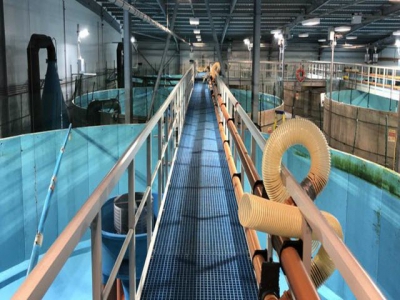Role of new farming technologies on salmon robustness examined

Consortium aims to provide new knowledge and scientific tools to monitor and enhance farming system efficiency and reliability.
Aquaculture experts at the University of Stirling in the U.K. are leading a £2 million study that aims to provide important information on the impact of innovative farming technologies on salmon.
The Robust-Smolt study — involving 14 institutions and organizations — will compare the robustness and susceptibility of Atlantic salmon to pathogens when reared in recirculation aquaculture systems (RAS) used in fish farming to reduce the need for fresh, clean water while maintaining a healthy environment for fish, the university said in an announcement.
“The rapid global expansion of the salmon industry has been made possible through the adoption of new farming technologies — including contained systems such as RAS — and husbandry regimes," project principal investigator Herve Migaud with the University of Stirling’s Institute of Aquaculture said. “These systems have clear advantages over land-based flow-through and freshwater loch systems, and young salmon produced in RAS under manipulated regimes — such as constant temperature and light — reach larger sizes and can be transferred to sea water earlier than ever before.
“However, our knowledge of the impacts these new rearing systems have on salmon physiology is very limited. The impact of differing microbiota, water chemistry, altered photo-thermal regimes on fish disease resistance at sea, immune function and microbiome have not been characterized, and these may explain the variable performance observed in farmed stocks," Migaud added.
Over the next three years, the consortium will aim to provide new knowledge and scientific tools to monitor and enhance farming system efficiency and reliability, fish robustness and health and sector productivity and sustainability.
The consortium includes the universities of Aberdeen, Exeter and Edinburgh, the Centre for Environment Fisheries & Aquaculture Science, Mowi, the Scottish Salmon Co., Scottish Seafarms, Cooke Aquaculture Scotland, Grieg Seafood, BioMar, PHARMAQ, the Scottish Aquaculture Innovation Centre and the Scottish Salmon Producers’ Organization.
Related news
 Seafood processing companies lacks skilled labourers
Seafood processing companies lacks skilled labourers Seafood processing enterprises in the southern province of Bà Rịa-Vũng Tàu are facing a serious shortage of skilled labourers, affecting their production
 Ca Mau eyes growth with special focus on shrimp production
Ca Mau eyes growth with special focus on shrimp production The Mekong Delta province of Ca Mau is expanding all its efficient agriculture, fishery and forestry models.
 Seafood, textile stocks soar thanks to good business performance
Seafood, textile stocks soar thanks to good business performance Positive business results together with the expectation of benefiting from free trade agreements helped seafood and textile stocks shoot up in the past year.